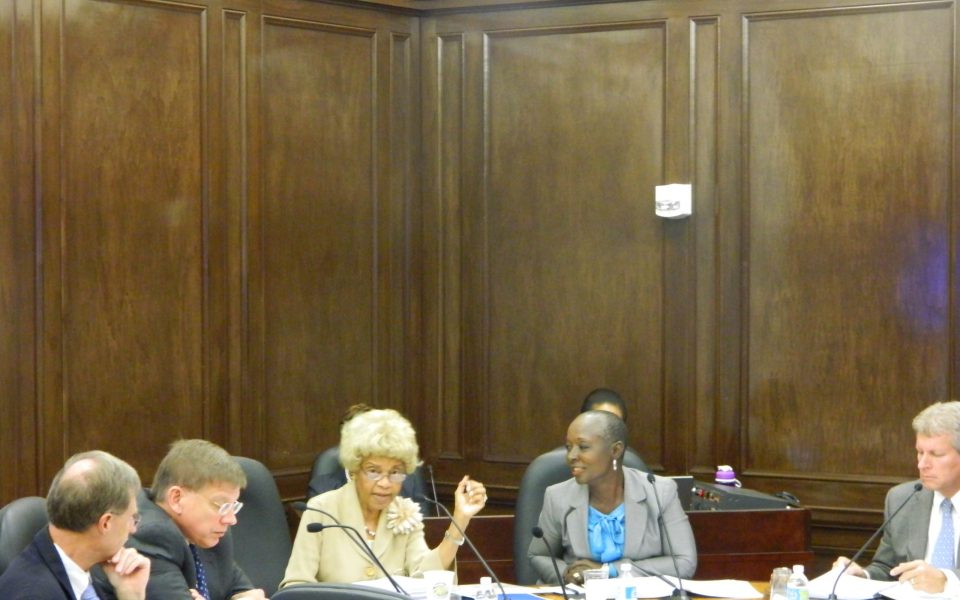by Jordan Green
Strains on downtown Winston-Salem confront members of Winston-Salem City Council with hard choices.
On Monday evening, members of the public safety committee of Winston-Salem City Council reluctantly embraced a future with less skateboarding and more police surveillance downtown.
Concerned about skateboarders scuffing benches, the leadership of the Wake Forest Innovation Quarter is requesting that the city extend its ban on downtown skateboarding to include the 200-acre campus, which is called the Central Industrial District for zoning purposes.
Mayor Allen Joines and Mayor Pro Tem Vivian Burke support the restriction, with Burke adding that she was concerned about traffic safety when she observed a skateboarder cruising down the middle of Patterson Avenue.
Council members encouraged President Eric Tomlinson to set aside some space for a skatepark in the Innovation Quarter. Tomlinson said he views skateboarding as a likely cause of “degradation” to the property while noting plans to develop a greenway that will be open to the public. Councilwoman Denise D. Adams, who represents the North Ward, suggested the Innovation Quarter collaborate with Baptist Hospital to create a skate park, arguing that the activity fits into a public-health agenda.
“You might want to find an area to put a skatepark,” she said. “They’re going to come. You can’t be there 24-7, and neither can the police.”
Councilman James Taylor noted that the item was for discussion purposes only, and the committee is not prepared to advance a recommendation for consideration of the full council.
Councilman Derwin Montgomery, who represents the East Ward, said he would not support the request. Similar to Greensboro, Winston-Salem has long had a ban on skateboarding downtown, and the two cities have not yet had to contend with the emerging trend of longboarding as a mode of transport. But Montgomery noted an inconsistency in the ban, considering that bicycles and Segways are allowed in the city streets.
“I’m not a skateboarder,” he said, “but in defiance I may get me one just to go skateboarding.”
Council members had fewer reservations about installing surveillance cameras, but questioned whether downtown is the area that needs them the most.
Among the benefits touted by police Chief Barry Rountree were protecting downtown public and private investments, creating a “force-multiplier” to enhance police presence and visibility, assisting in criminal investigations and prosecutions and improving the perception of public safety.
“On a downtown public street there is no expectation of privacy,” Rountree said. “The camera would only record what the public could see.”
Jason Thiel, president of the Downtown Winston-Salem Partnership, said he supports the introduction of public-safety surveillance cameras downtown. Charlotte, Raleigh and Fayetteville have them, and Greensboro is discussing adding them soon.
“People have come to expect this kind of thing in dense urban areas,” Thiel said.
Adams asked the police department to provide evidence of a need for cameras in downtown, adding that there is more crime in the outlying areas of the North, Northeast, East, South East and South wards.
Councilwoman Molly Leight, who represents the South Ward, said constituents have complained to her about getting accosted by panhandlers downtown.
“I wanted to start it downtown, but we can gradually move it out to other areas of the city that need to be addressed,” Rountree said, eventually agreeing to a compromise between placing 10 cameras downtown and 10 in an undetermined location where high levels of crime have been documented.
The uneasy stance taken by members of the public-safety committee on surveillance cameras and skateboarding cropped up earlier during a finance-committee meeting. Burke, Adams and Montgomery, the three African-American members of the committee, argued for conditions requiring that affordable housing be written into the terms of deals between the city and developers.
Brookstown Partners LLC purchased several tracts of land near BB&T Ballpark from the city in 2009 with plans for a mixed-used development, with the city financing the sale. The company, which is owned by Billy Prim, has been unable to develop the property since the economy stalled, and is seeking a loan extension.
“The intent is for it to be sold for retail, but if it is sold for housing they would make every effort to make it affordable,” said Lisa Saunders, chief financial officer for the city.
Adams moved approval of the loan extension, while arguing that future land deals need to spell out expectations about how much affordable housing will be included. The motion passed three to one, with Montgomery dissenting.
“Our downtown needs to mirror our community,” Adams said. “What are we doing with our inner city? We don’t want to build a gated community downtown. That’s what we say. But that’s exactly what we’re doing. They need to build some diversity into their development.”
Burke echoed Adams’ sentiments.
“If you look at some of these good boys, it’s the same people,” she said. “They don’t bring in blacks, Hispanics and women.”
Join the First Amendment Society, a membership that goes directly to funding TCB‘s newsroom.
We believe that reporting can save the world.
The TCB First Amendment Society recognizes the vital role of a free, unfettered press with a bundling of local experiences designed to build community, and unique engagements with our newsroom that will help you understand, and shape, local journalism’s critical role in uplifting the people in our cities.
All revenue goes directly into the newsroom as reporters’ salaries and freelance commissions.


Leave a Reply